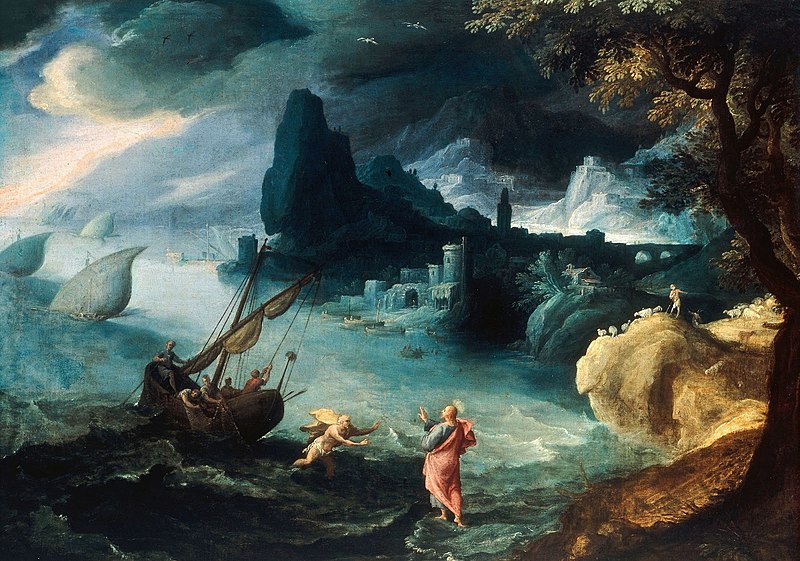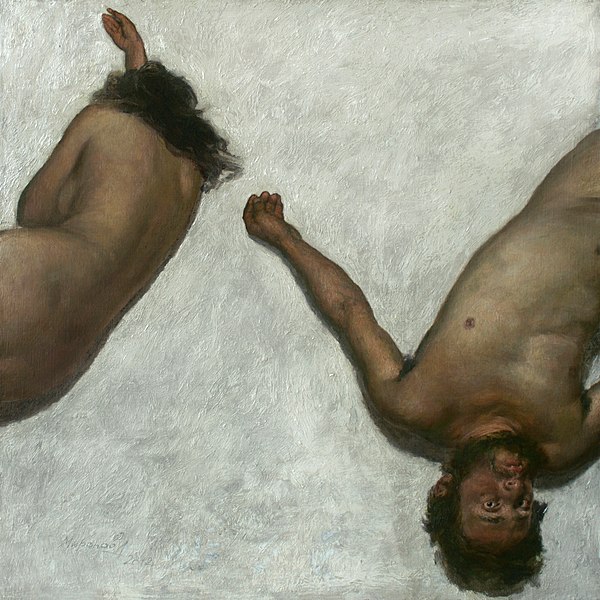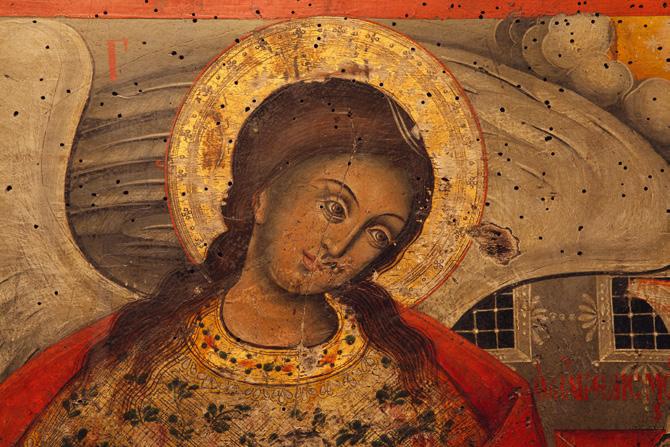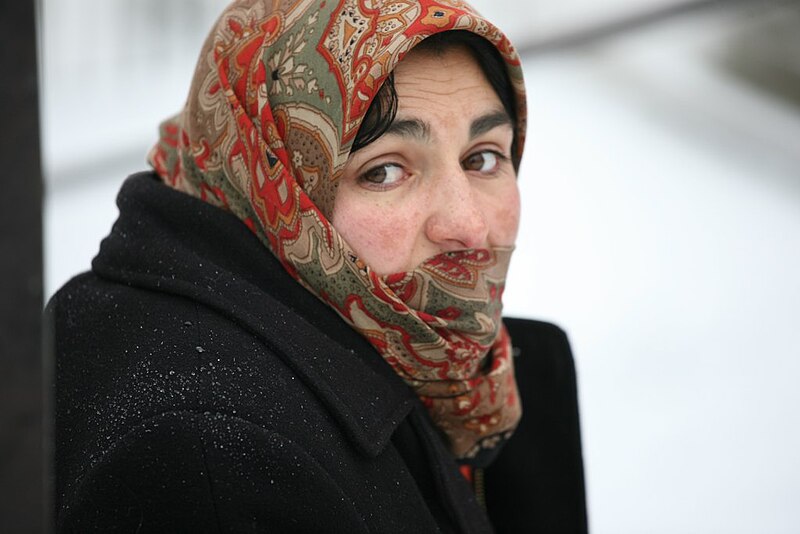
A message for the first Sunday in Advent, shared this morning at Los Altos Lutheran Church. (The primary texts were Isaiah 64:1-9 and Mark 13.24-37).
We talked about hope last week when Miriam remembered for me the words of Emily Dickenson’s poem, “Hope is the thing with feathers.” I have to admit that when I heard her recite the poem, it seemed more substantial and profound than I had expected. But the point we were making is that Biblical hope is not a wish or desire for things to get better; it is rather a confidence rooted in a promise.
So when the prophet this morning cries out, “O that you would tear open the heavens and come down,” he is not expressing a wish, he is praying for God to come and deliver the people. The prophet is living in a time when faith has grown cold. Life is hard. God seems far away. And, with God seeming distant, the people have grown callous and no longer bother to call upon God or follow God’s way. It is why the prophet prays for God to come with a new act of deliverance. It is why the prophet reminds God that this people are his people. God is the potter and the people are God’s clay. God needs to claim his people and come make something holy and good of them.
“O that you would tear open the heavens and come down.”
At the heart of the Advent season is God’s answer to this profoundly human and universal prayer. Advent is about God tearing open the barrier between earth and heaven and coming to reign – coming at the consummation of history, coming to us now in the joys and sorrows of our lives, and coming into the world in the child of Bethlehem.
The color for Advent is blue. The history of why it’s blue is less important than the fact that blue is a color of hope. It represents the darkness of the night giving way to the light of day. And this brings us to the other visual image of this season: the dawning of light into the world – in the full blaze of glory on that day when fear and darkness are forever banished, when the light of God comes to our lives in moments of fear and darkness, and in the incarnation when the Word becomes flesh and dwells among us. As Advent moves towards Christmas, it moves towards the message in the Gospel of John that we read on Christmas morning:
In the beginning was the Word, and the Word was with God, and the Word was God… 3All things came into being through him, and without him not one thing came into being. … 4in him was life, and the life was the light of all people. 5The light shines in the darkness, and the darkness did not overcome it.
These are not just religious words. It is a deep and profound human experience that God enters into the world and into our lives in ways that are radiant with grace and life. It always seems to surprise us, but it shouldn’t, because it is promised to us. God is a god who, however much he may sometimes seem absent, keeps showing up.
God comes in ways that are often unexpected and surprising. He shows up at Cain’s door when he is bitter with revenge towards his brother. He shows up in a burning bush when Moses has fled into the wilderness and is tending sheep. He shows up to Gideon when he is trying to thresh his wheat in secret so that the Philistines who plunder his country won’t take it. God shows up in surprising and unexpected places – to persecuted Hannah when she is weeping and praying at the doorway of the tabernacle and the priest thinks she’s drunk. To childless Zechariah when he is serving in the temple. To Ezekiel when he is standing along the canal in exile in Babylon. To Peter when he is mending his fishnets. And, of course, to Mary when she has not yet gone to live with her husband, Joseph. God keeps showing up.
Advent is about this God who comes. It’s why we have images of doors in the sanctuary alcoves. And over the season, watch the alcoves and you will see doors opening and the light continually increasing until we get to Christmas. (Of course, you have to come on Sunday morning, December 24th, to see all the doors open.)
So the Gospel text that is before us this morning is from Mark 13. We have been reading Matthew all last year and for the next year we will be reading primarily from Mark. Mark is composed during the Judean revolt when armies are marching and Jerusalem will be destroyed. Jesus declares that the temple will be destroyed. The marriage of power and politics and wealth and religious leaders and the use of the name of God at the top of Judean society will be torn down. Jesus warns his followers not to be led astray by those who are proclaimed as saviors or messiahs when that convulsion happens. And he urges us to be awake and watchful like members of a household waiting for the head of the family to come.
(It is important that we understand this about the use of the word slaves waiting for their master. Slavery was very different in the ancient world than in the American experience. Slaves were members of the household. They were understood to be – and understood themselves to be – part of the extended family. These are not hired hands afraid of being caught goofing off, these are household members eager for the head of the house to return.)
When I was a senior at Palo Alto High School there was a student strike to protest the war in Vietnam. There was a grass courtyard enclosed on several sides by buildings and by a colonnaded walkway on the rest. The students were sitting on the grass and speakers were addressing them at the far end of the courtyard. My math teacher from my junior year was standing in the colonnade watching and I came and stood near him. We loved him and, in fact, Deb and I invited him to our wedding. He drank a milkshake every day at lunch and walked through the amphitheater observing the students in ways that would show up as math problems the next day. He seemed to know who was going with whom and what was happening among us all.
As Mr. Parker watched the strike, he turned to me and said something about having a cabin in the Sierra’s. He wasn’t by any means a survivalist, but in that moment I could see in his eyes that he thought the fabric of society was coming apart.
I watched a lot of adults in those years look upon the profound troubles of that era – the riots, the assassinations, the protests, the convulsions in society – and feel deeply fearful about the future. Dad said that flying out of what was then Washington National Airport over the District of Columbia following the riots there, reminded him of flying over bombed out Berlin after the war. Mother called the city in fear when city workers came out and began to dig up the sidewalk late one afternoon, and then left for the day with the rubble still in place. She feared those chunks of concrete could become weapons and, as I remember it, made the city come pick them up that day.
The Symbionese Liberation Army, the Black Panthers, Malcolm X, the National Guard being called out to escort children to school as crowds of white adults shouted curses at the children. George Wallace declaring “Segregation now, segregation tomorrow, segregation forever” and winning five states plus an elector from North Carolina in the 1968 presidential election. The bombings of military recruitment stations and defense contractors. The murder of Medgar Evers by white supremacists. The brutal torture and murder of 14-year-old Emmett Till.
They were fearful times. They are not the only fearful times in our country’s history. I have heard stories of those who lived through the depression. My father remembers the dust storms in eastern Colorado. We have seen the famous photographs of the displaced persons taken by Dorothea Lange.
And if we could go back, there was the convulsion of the whole country over slavery that ended with a million dead (in a nation of 30 million of whom 4 million were slaves). There were tumults because of massive immigration before and after the civil war. There was the corruption of Tammany Hall, the terrorist bombing of Wall Street in 1920, President Harding sending the Army to fight on behalf of the coal companies against coal miners in West Virginia (The Battle of Blair Mountain), and the Teapot Dome corruption scandal.
Fear comes. We want life to be safe, but it rarely is. Or, at least, it seems like it doesn’t stay safe for long.
It doesn’t surprise me that the convulsions of the 60’s led to Hal Lindsey and the idea that we were the last generation before the coming of the Lord. Social upheaval always begets apocalyptic ideas. At one point Luther thought that he, too, lived in the final generation.
And so did the people in Mark’s congregation. They were living in the midst of war, hostility, and fear. In verse 12, before the portion we read this morning, Jesus says:
Brother will betray brother to death, and a father his child, and children will rise against parents and have them put to death; and you will be hated by all because of my name.
Mark reminds his community that Jesus said that the temple would fall and advised his followers to flee the city when the time came. He reminds them that Jesus understood that times of trouble would come. And he reminds them that Jesus warned them not to be led astray. Others would be acclaimed as messiahs and saviors and we shouldn’t be deceived.
These are all helpful words for us when we are in distress: Don’t lose our way. Don’t lose our hope. Remember what he has told us: “Keep watch, I will come.”
Keep watch, I will come. Expect me to show up when you are in fear. Expect me to show up when you are in distress. Expect me to show up in the most ordinary of moments, when you are washing dishes, or doing laundry, buying groceries. Watch for me. Watch for me in the kindness of strangers. Watch for me in the opportunity to be kind. Watch for me in the lonely nights or when trouble seems to surround. Watch for me. Expect mercy.
See not only what is dark, but what is light. See not only what is cruel, but what is kind. See not only confusion, but clarity. Hear not only the harsh and angry words, but the calm and wise ones.
Watch for God to come to you in the bread and wine and the words “given for you.” Watch for God to come in the daily scripture verses. Watch for God to come in the first breath of the morning and the last sigh of the night. Watch for God to open doors to meet you.
Remember God has already opened the heavens and come down.
Remember the door of the tomb has been rolled away.
Remember that the New Jerusalem is a city where the gates never close.
Watch, for God will come.
Amen
Image: https://commons.wikimedia.org/wiki/File%3AEmporio_(4494560043).jpg By Klearchos Kapoutsis from Santorini, Greece (Emporio Uploaded by Yarl) [CC BY 2.0 (http://creativecommons.org/licenses/by/2.0)%5D, via Wikimedia Commons

















